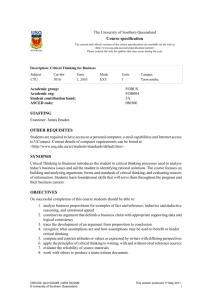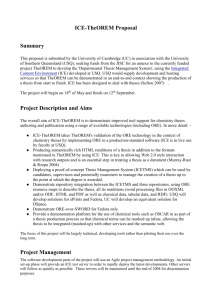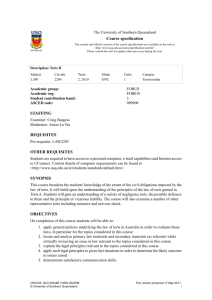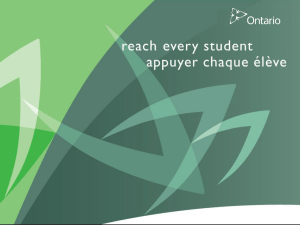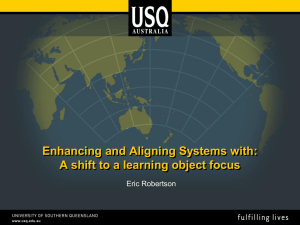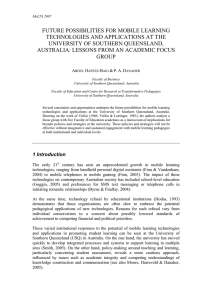toowoomba and district mathematics teachers` association
advertisement
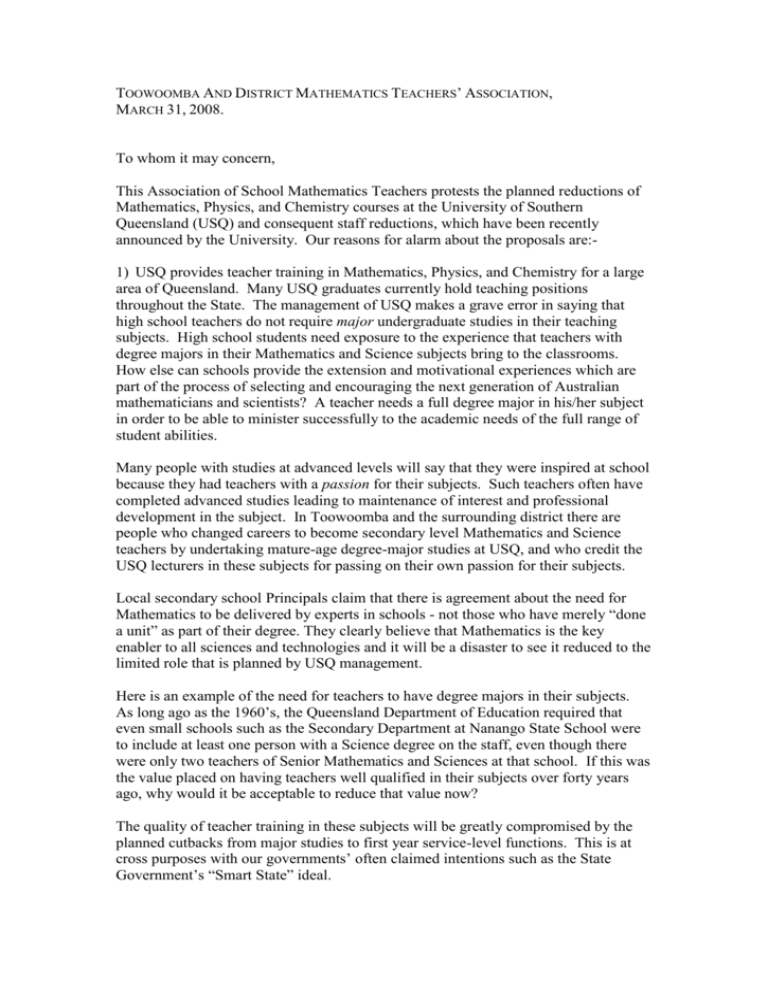
TOOWOOMBA AND DISTRICT MATHEMATICS TEACHERS’ ASSOCIATION, MARCH 31, 2008. To whom it may concern, This Association of School Mathematics Teachers protests the planned reductions of Mathematics, Physics, and Chemistry courses at the University of Southern Queensland (USQ) and consequent staff reductions, which have been recently announced by the University. Our reasons for alarm about the proposals are:1) USQ provides teacher training in Mathematics, Physics, and Chemistry for a large area of Queensland. Many USQ graduates currently hold teaching positions throughout the State. The management of USQ makes a grave error in saying that high school teachers do not require major undergraduate studies in their teaching subjects. High school students need exposure to the experience that teachers with degree majors in their Mathematics and Science subjects bring to the classrooms. How else can schools provide the extension and motivational experiences which are part of the process of selecting and encouraging the next generation of Australian mathematicians and scientists? A teacher needs a full degree major in his/her subject in order to be able to minister successfully to the academic needs of the full range of student abilities. Many people with studies at advanced levels will say that they were inspired at school because they had teachers with a passion for their subjects. Such teachers often have completed advanced studies leading to maintenance of interest and professional development in the subject. In Toowoomba and the surrounding district there are people who changed careers to become secondary level Mathematics and Science teachers by undertaking mature-age degree-major studies at USQ, and who credit the USQ lecturers in these subjects for passing on their own passion for their subjects. Local secondary school Principals claim that there is agreement about the need for Mathematics to be delivered by experts in schools - not those who have merely “done a unit” as part of their degree. They clearly believe that Mathematics is the key enabler to all sciences and technologies and it will be a disaster to see it reduced to the limited role that is planned by USQ management. Here is an example of the need for teachers to have degree majors in their subjects. As long ago as the 1960’s, the Queensland Department of Education required that even small schools such as the Secondary Department at Nanango State School were to include at least one person with a Science degree on the staff, even though there were only two teachers of Senior Mathematics and Sciences at that school. If this was the value placed on having teachers well qualified in their subjects over forty years ago, why would it be acceptable to reduce that value now? The quality of teacher training in these subjects will be greatly compromised by the planned cutbacks from major studies to first year service-level functions. This is at cross purposes with our governments’ often claimed intentions such as the State Government’s “Smart State” ideal. 2) The current level of government funding flowing to USQ from the present numbers of students of Mathematics and Science courses is clearly sufficient to allow the retention of all such courses presently offered at USQ. This is particularly clear when it is realised that Federal Government funding for Mathematics and Statistics courses was recently increased, making it hard to understand why the planned reductions are said to be necessary. 3) The Departments of Mathematics, Physics, and Chemistry at USQ have acted as an excellent support network for teachers in schools throughout our local region. Their academic staff have been ever ready to serve local schools by - delivering motivating subject-specific talks to our secondary students at schools during normal school time, but also at Mathematics activity weekends and in after-school extension programmes - providing teachers with high-quality professional development in-service seminars in their teaching subjects, keeping teachers aware of real-life applications of the subjects - assisting with the conduct of regional inter-school subject competitions, by setting questions and officiating at the competitions - mentoring gifted students in our schools, by encouraging them to extend their achievement through tertiary level studies in Sciences and Mathematics while still at secondary school. (How could this be sustained if the proposed cuts are implemented?) - participating in Queensland Studies Authority Syllabus Committees, thereby helping to articulate secondary and tertiary studies and keeping school courses relevant to the needs of industry. 4) In the age of the Smart State strategy of the Queensland government it seems somewhat short-sighted to reduce one of the most enabling areas of learning and intellectual pursuit. If USQ is going to position itself for a future, then failing to provide a comprehensive approach to the higher order thinking and learning produced by Mathematics education is a missed opportunity. By reacting to current market trends in careers only, the USQ is effectively shutting the door to the development of intellectual capital in Australia and appealing through its undergraduate and postgraduate offerings only to the current skill/labour shortfall. In effect, this “dumbing down” of USQ degrees will not meet the long term intellectual capital needs of Australia as we move from an economy based on excavation to one of intellectualisation. By reducing the numbers of USQ staff in these subjects, the considerable advantages listed above would be virtually lost. How would USQ staff be able to continue with this valuable leadership role if crippled by the planned reductions? School teachers in this area are well aware of and appreciate the benefits they gain from the professional attitude and support of USQ staff. Under the planned reductions, USQ will lose mathematics and statistics researchers of international standing, and expertise in the core enabling sciences will be greatly weakened. We are deeply concerned for USQ's teacher education and outreach, and for the damaging messages this sends about higher education's commitment to the mathematical sciences generally.
